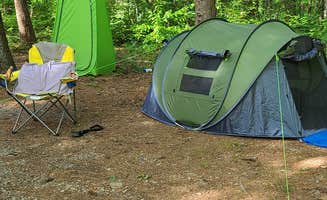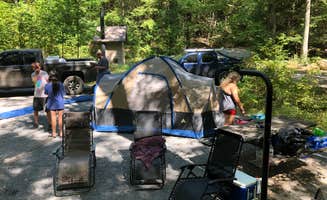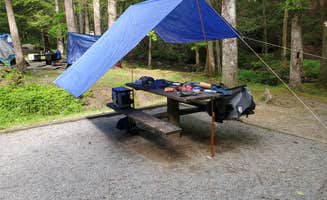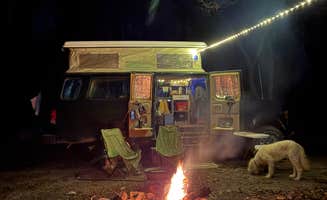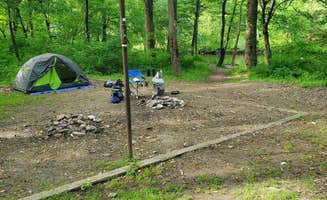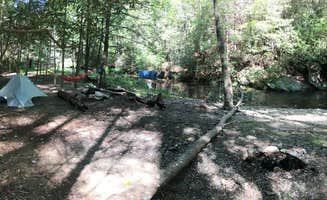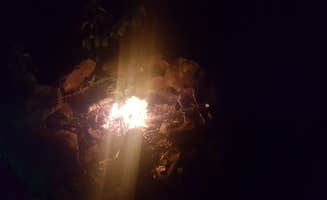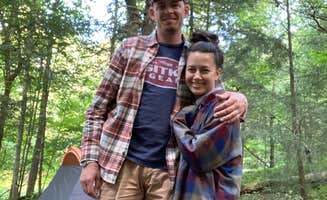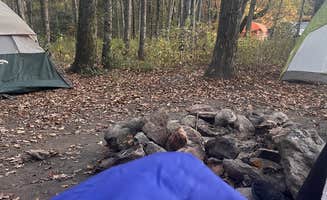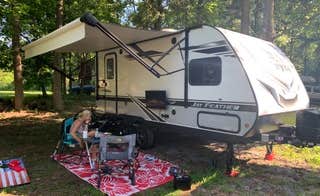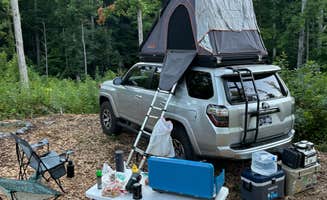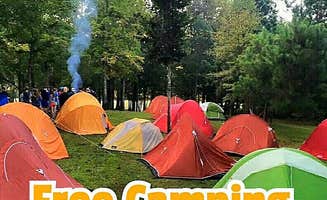Camping near Cisco, Georgia offers diverse terrain at elevations ranging from 1,100 to 4,000 feet across the Cohutta Wilderness Area. Situated on the western edge of the Blue Ridge Mountains, this region features forest service roads that transform dramatically with seasonal changes, becoming particularly challenging after heavy rainfall. Fall temperatures typically range from 45-75°F, creating ideal camping conditions when summer humidity subsides.
What to Do
Hiking to waterfalls: Explore the 3-mile round-trip Benton Falls trail at Chilhowee Recreation Area for a moderate hike suitable for most skill levels. "We did the Benton Falls hike and it was lovely! 3 miles RT. Fall color was just peaking 🍂" notes camper Tracy J.
Fishing for native species: Try fishing at Lake Conasauga, which sits at the highest elevation lake in Georgia. "The lake is full of bass and brim and is perfect for kayak fishing," reports Colben F. Access requires "about a 45 minute drive up a gravel road, up the mountain," according to Kelly N.
Mountain biking: The Tanasi trail system connects directly to camping areas. "It was great to mountain bike straight from the campsite to the Tanasi trail system," shares Chelsie N. of Thunder Rock Campground. Many trails include technical sections with significant elevation changes, loose gravel and rocks.
What Campers Like
Creek-side sites: Ball Field Dispersed Camping Area provides free camping with mountain views. "I searched on terrain maps for some of the best south facing skies for a great view of the belt of the milky way. Go here on a new moon night in the summer and you're sure to have a great night of uninterrupted beauty!" recommends Tyler J.
Higher elevation camping: Lake Conasauga offers tent sites at 3,150 feet elevation, providing natural cooling during summer months. "Had a great experience, it's my new favorite camping spot. Stayed in the upper loop away from the lake but could still see the water from where we stayed," reports Shanna S.
Swimming holes: Natural swimming areas form along Mill Creek. Zane M. from Hickory Gap notes, "There's what people called a water hole swimming area down the creek a half mile hike but it hadn't rained much so it wasn't very full but still cool!"
What You Should Know
Road conditions: Access to many campgrounds requires careful driving on unpaved roads. Mike H. describes Hickey Gap's approach: "The road up there is all rock/dirt with a several hundred foot drop-off on the right side and no guardrail. There were a few hairpin turns. And then the driveway to and from the camp area is quite steep."
Wildlife considerations: Bears are active throughout the Cohutta Wilderness. At Fort Mountain State Park Campground, "We had bear visitors, something they'll warn you about upon arrival. The bears just added to the appeal of this place though," says Shelly C.
Toilet facilities: Vault toilets at primitive sites receive minimal maintenance. At Hickey Gap, one camper reported the bathroom was "borderline unusable for anything other than the worst of emergencies." Bring appropriate supplies for sanitation.
Cell service limitations: Most wilderness areas have minimal connectivity. Roy B. notes at Ball Field Dispersed Camping Area, "The cell connection is intermittent and usually only one bar (or no cell)."
Tips for Camping with Families
Platform camping sites: For families wanting structure without tents, Chilhowee Recreation Area offers unique accommodations. "As one of our primary requirements for camping is privacy and a place our kids can run around without bothering anyone else, having a place slightly off the main road sounded perfect--and it was," shares Stephanie J.
Swimming options: Look for campgrounds with designated swimming areas during summer. "There is a small hike to Cumberland Falls, which is gorgeous!! We had a great time! Hot water for showers/restroom facilities," reports Alison B. about Chilhowee.
Wildlife viewing opportunities: Schedule early morning or dusk walks for best wildlife viewing. "Wildlife galore, amazing trails," notes Shelly C. about Fort Mountain State Park, where deer sightings are common near campsites.
Tips from RVers
Site selection considerations: At Harrison Bay State Park Campground, RV sites vary significantly. "Loop A is an RV loop with very little shade, and is closest to the playgrounds and picnic pavilions. Sites 7-11 and 13-14 in this loop have the most shade, with most other sites in full sun," advises Stephanie J.
Dump station challenges: Some campgrounds have difficult-to-navigate dump stations. Mike N. notes at Chilhowee, "From the B loop, you have to traverse about a 120 degree switchback to get to it. My friend who was there pulling a 5th wheel decided not to try it and opted to pay to dump somewhere else."
Hookup limitations: Many wilderness campgrounds offer limited or no hookups. "The RV sites have water and electric, and they have a dump station," notes Lori H. about Adventures Unlimited Campground. Plan water usage accordingly when staying at primitive sites.


